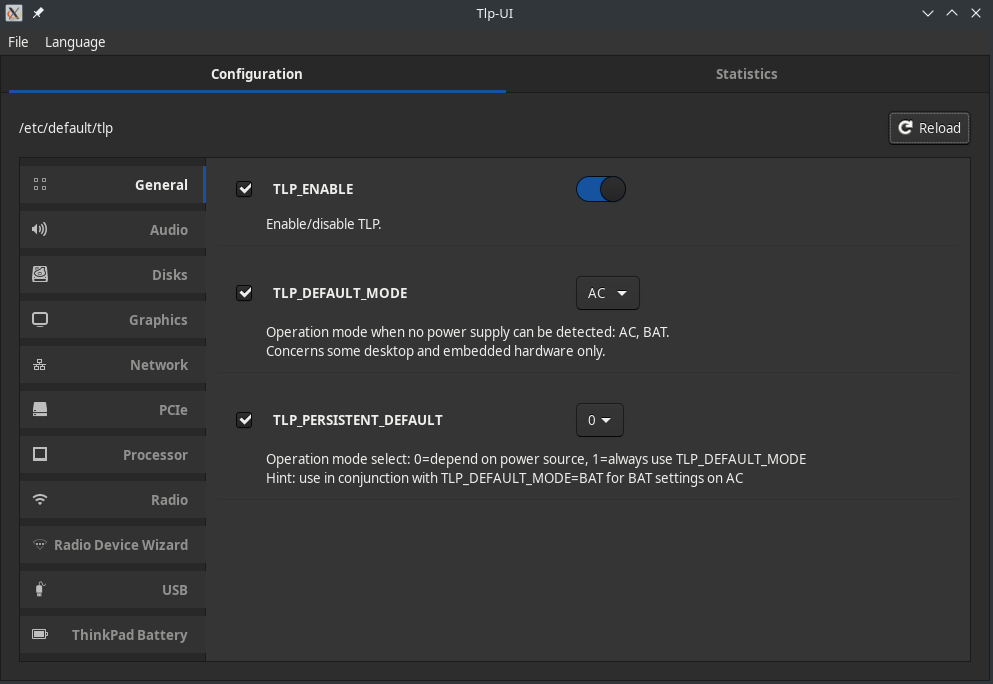Difference between revisions of "Power Management/ru"
Views
Actions
Namespaces
Variants
Tools
(Created page with "TLP можно настроить вручную, отредактировав файл '''/etc/default/tlp''' как описано в [http://linrunner.de/en/tlp/docs/tlp-co...") |
(Created page with "Более простым способом настройки TLP является использование графического инструмента [https://github.c...") |
||
| Line 40: | Line 40: | ||
Более простым способом настройки TLP является использование графического инструмента [https://github.com/d4nj1/TLPUI TLPUI]. | |||
Revision as of 11:23, 23 January 2023
Для минимизации выделения тепла и экономии энергии можно использовать методы энергосбережения. Для ноутбуков это особенно важно, так как они могут значительно продлить срок службы батареи, а чрезмерное тепло может быть некомфортным и шумным для портативных устройств.
Программы для управления питанием
Существует несколько вариантов управления питанием в Manjaro. В этой статье мы расскажем о трех наиболее популярных.
TLP
TLP является наиболее часто используемой опцией для автоматического управления питанием.
Установка TLP
TLP доступен из репозиториев Manjaro, может быть установлен с помощью вашего любимого менеджера пакетов или с помощью ввода следующей команды в терминале:
pamac install tlp
Теперь, когда он установлен - необходимо запустить и включить службу. Это можно сделать с помощью команды:
systemctl enable tlp --now
Настройка TLP
TLP можно настроить вручную, отредактировав файл /etc/default/tlp как описано в официальной документации.
Более простым способом настройки TLP является использование графического инструмента TLPUI.
To install TLPUI install the package tlpui using your favorite package manager or with the command
pamac install tlpui
Laptop Mode Tools
An Alternative to TLP for laptops is Laptop Mode Tools(LMT).
Installing LMT
To install laptop-mode-tools, enter the following command into your terminal:
pamac install laptop-mode-tools
Once installed, to enable LMT to start automatically every time you boot your computer, enter the following into your terminal:
sudo systemctl enable --now laptop-mode.service
LMT automatically configures some settings for you in order to optimize your laptop's battery life.
LMT Configuration
For configuration, the file to edit is /etc/laptop-mode/laptop-mode.conf}
The individual kernel modules can be configured from the configuration files present in /etc/laptop-mode/conf.d/
PowerTOP
PowerTop a diagnostic tool used to identify and report issues with power consumption and management. It can be used as a reporting tool, an automated power management tool or both.
Installing PowerTop
It can be installed as
pamac install powertop
Generating Reports
You can generate a report using powertop with the command:
sudo powertop --html
This will create the file powertop.html in the current directory. You can open this file in any web browser.
If you are using TLP for power management you may notice some differences in the recommendations between the tools. The article Comparing TLP with PowerTop reporting describes some of the reasons for these differences.
Automated Tuning with PowerTop
The command sudo powertop --auto-tune" will allow PowerTop to automatically tune power management based on it's recommendations.
From a practical perspective, the best way to use PowerTops auto-tuning is with a systemd service.
To create, start and enable a systemd service for PowerTop you can use the commands:
sudo sh -c "echo -e '[Unit]\nDescription=PowerTop\n\n[Service]\nType=oneshot\nRemainAfterExit=true\nExecStart=/usr/bin/powertop --auto-tune\n\n[Install]\nWantedBy=multi-user.target\n' > /etc/systemd/system/powertop.service" sudo systemctl enable --now powertop.service
Temperature/Thermal Management
ThermalD
ThermalD, the Linux Thermal Daemon can be used to automatically handle CPU frequency scaling according to system load.
To install it, install thermald in your favorite package manager or use the command:
pamac install thermald
After installing it needs to be configured to automatically start at boot in order to work:
sudo systemctl enable --now thermald

